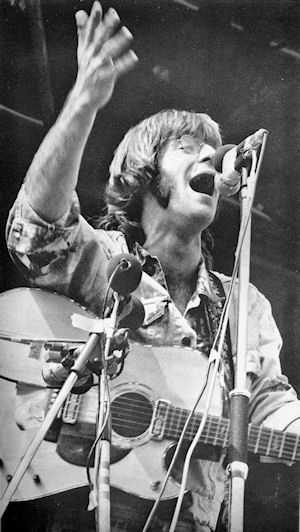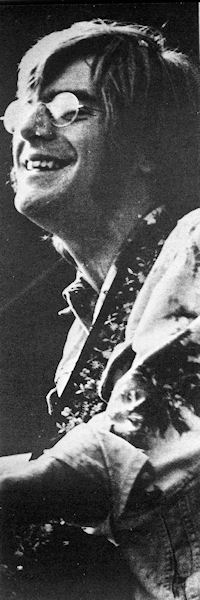|
John Sebastian — Tie-Dyed in Gaza
Clive James
Mobile users: please note, ‘Smash Flops’ content is best viewed on a laptop or desktop computer
If I had to pick the lyricist preceding Randy Newman who consistently wrote with a clean edge and pure intelligibility, I’d hesitate over Robbie Robertson — who now goes looking for obscurity as often as he seeks to avoid it — and probably settle for John Sebastian, when he was still the master spirit of the Lovin’ Spoonful.
|
|
The Spoonful was a proto-group, like Buffalo Springfield, it was the expression of one man’s personality; and again unlike Buffalo Springfield, it started something nobody else could finish. Just because Sebastian rates a mention in ‘Creeque Alley’, or can be found leaning heavily into the formative scenes of Gleason’s book on the Californian salad days, doesn’t mean that his achievement was absorbed and built on.
Sebastian is a permanent singleton. All that’s happened is that he’s turned from a singleton who represented something concrete into a singleton that represents something abstract: his early work was all compact, trimmed and estimable, while his later activities have mainly been in the ineffable realm of personality and image projection. The chronology of these things is always different from what appears on the surface, but it seems a fair guess that by the time of Woodstock — where his tie-dyed appearance and nutty-professor forgetfulness were at the centre of the festival’s self-appreciation — he had already given up his earlier ideals of concentration, compression, finish, polish.
Perhaps this was a necessary part of the pattern of things: the ideology of spontaneity had already taken over in California, where it was the Dead and the Airplane that embodied the new spirit. Kitted out as the Pied Piper, Sebastian helped himself forget that he could actually write. And after Woodstock, of course, the ideology of spontaneity took over the world, to the extent that we are only just emerging from it.
|  |
|
If you play a Lovin’ Spoonful track and a Randy Newman track one after the other, you can barely hear the join: the care for language, the avoidance of redundancy, the wit and the liveliness — they’re the same qualities in both lyrical events. From the point of view of the demanding listener, the stretch of time that fell between them is largely waste. And that stretch of time, needless to say, is pretty well coterminous with the life-span of Woodstock Nation. Newman’s current (and long-delayed) emergence into force marks the end of dumb sincerity’s unquestioned reign. Sebastian was one of the men — the leading man — overwhelmed by dumb sincerity in the first place.
I’m aware, when I sketch outlines like this, of trying to establish what amounts to an intellectual myth. It can always be said that there are too many practical events involved to allow for such elegant interpretations. For example, Sebastian was raped by his record companies in the frantic scramble to re-package Spoonful product after Woodstock, and they even stooped to releasing out-takes of his solo discs. It would have been understandable if he’d decided to blow his head off with STP, or take a turn pushing Ironside’s wheel-chair, or even do what he did do — transform himself irreversibly into the prematurely doddering under-achiever, Cheapo-Cheapo.
But with all this said, one is still bound to insist that there are things which Time will simply not allow at the time — and that one of these things was a further development along the lines the Spoonful had marked out. That particular combination of clarity and destiny couldn’t compete with the nodding afflatus of the youth culture, which demanded only one thing — that nothing should be demanding.
Sebastian was clever. For the youth culture, cleverness belonged with imperialism in the waste disposal unit of history. ‘A lot of people’ Sebastian said approvingly in late 1968 ‘are seeking to make music as naturally as possible.’ All he meant was that the age of over-dubbing was finished, but it’s difficult not to assume that he was already deciding to add his lyric technique to the pile of discarded fakery.
It was a brilliant lyric technique. Newman is the only man who has outstripped it. Robertson, when trying to be clear instead of abstractly gnomic, had equalled it. Joni Mitchell has got close, but language can seduce her away from the point: you get closer to Sebastian’s secrets by listening to Chuck Berry than by paying attention to the themes of his literate peer-group. Sebastian's chief characteristic is an extreme, even elliptical, efficiency.
And I could feel I could say what I want
That I could nudge her and call her my confidante
And now I’m back alone with just my shadow in front
At six o’clock...
|
|  |
Sebastian was a solid-rhymer rather than a vowel-rhymer, so he was always coming up with interesting terminal words like ‘confidante’; equally important, of course, was the skill he had available with which to tie them unobtrusively into the rhyme pattern. Since the line ending with ‘confidante’ is set up as an expansion on the point made in the first line (note the careful, functional placing of ‘That’ at the beginning), it is at liberty to end with an extravagance. With the third line, however, Sebastian draws the thread tight, completing the triplet with a plain word, ‘front’, while simultaneously producing a startling image — the image about his own shadow.
The music makes the lay-out of these lines much clearer than it seems on the page, but the point to take is that Sebastian knew how to pack together the different kinds of life language can have — knew how to pack them together without producing confusion. The only reason I use the word ‘efficiency’ for this virtue is that the word ‘tact’ is out of favour, but strictly, tact is what it is. And as always, tact and wit go hand in hand. Not just in the outrageous shout-ups like “Jug Band Music” (which contains the cleverest long-line gag-writing rock music has yet produced) but in miniaturist mood-pieces like the exquisite ‘Boredom’.
Trucks go rollin’ by
Past the pumps and highway signs.
Some desperately feeble little technical joke is the perfect thing to play off against the song’s crushing mood, and the way the word “pumps” receives a musical stress shows that the writer is involved in language to the last doomed gasp. The classic Sebastian songs didn’t make any claims they couldn’t immediately back up — they didn’t throw art away on the assumption that a straight assertion was more sincere.
Efficient in his artistic nature, Sebastian was able to control extravagance, and therefore use it to telling effect — which is what ‘Nashville Cats’ is all about. Those lines about playing the guitar ‘twice as better than I will’ are enjoying themselves as well as telling the story. When it isn’t being nervously austere, Sebastian’s language can accumulate in astonishing rococo pile-ups —
|
|
but always in a disciplined way, and always on a framework free of syntactical distortion. You can follow the teeming stanzas of ‘Jug Band Music’ or ‘Nashville Cats’ without losing the drift for a second.
As well as, and perhaps beyond, the characteristics I’ve already mentioned, there looms the imponderable one. Sebastian’s sheer lyricism made him unique: words took off their glasses and let their hair down at his touch.
Determined to remember all the cardinal rules
Like sun-showers are legal grounds for cuttin’ school...
The way that second line sets ‘sun-showers’ and ‘legal grounds’ ringing subtly against one another is probably beyond analysis. Anyone will admit that to be able to do it is a gift. What I’m trying to argue, in Sebastian’s case, is that it’s a precise gift. Our sentimental inclination to give kiddy-cuddling old Cheapo-Cheapo the credit for such a talent ought to be resisted. It all goes back to something more edgy, nervous, controlled and — if you like — calculating than that latterday minstrel goes in for.
One thing for certain: we need more of it. Sometimes you get the feeling that it will take only a few more heartfelt stupidities to sink the whole shebang.
|
|
Cream, November 1972
© Clive James
Photos by John McKenzie
|  |
|